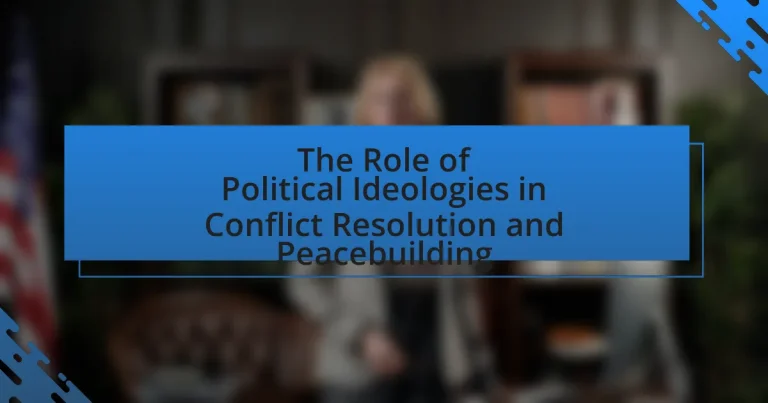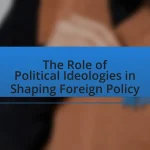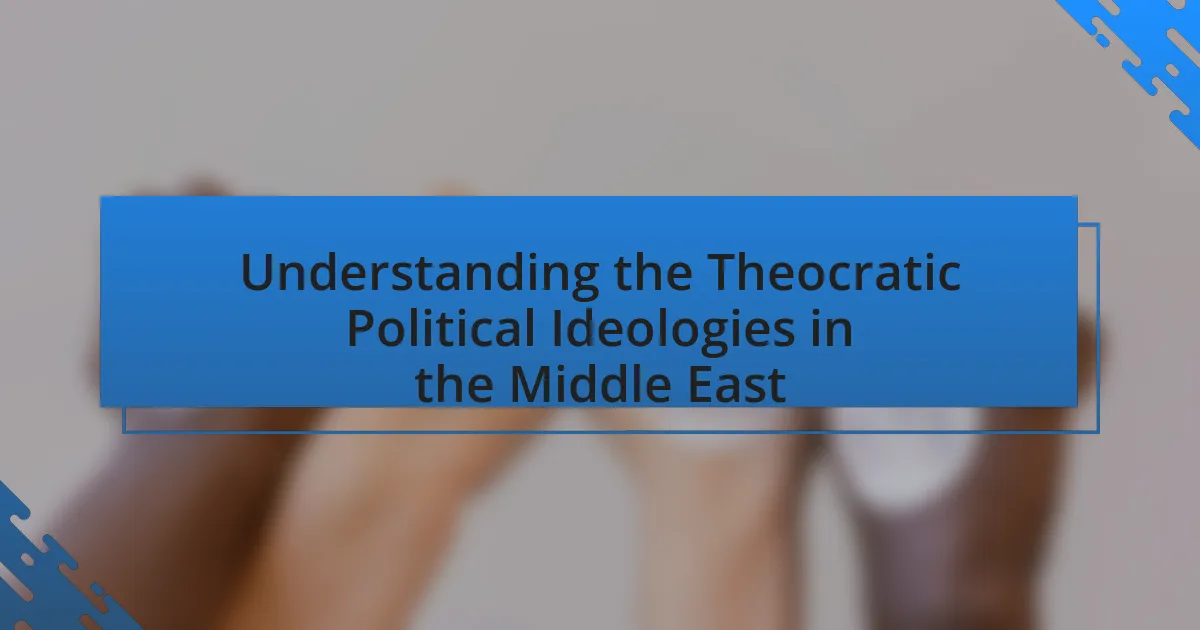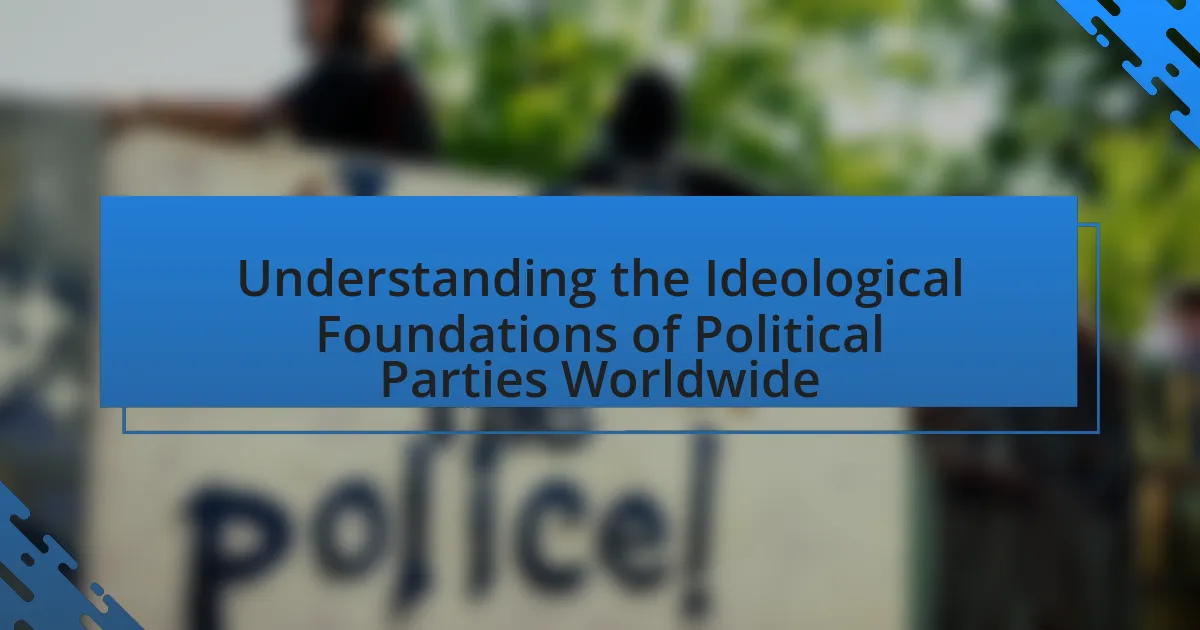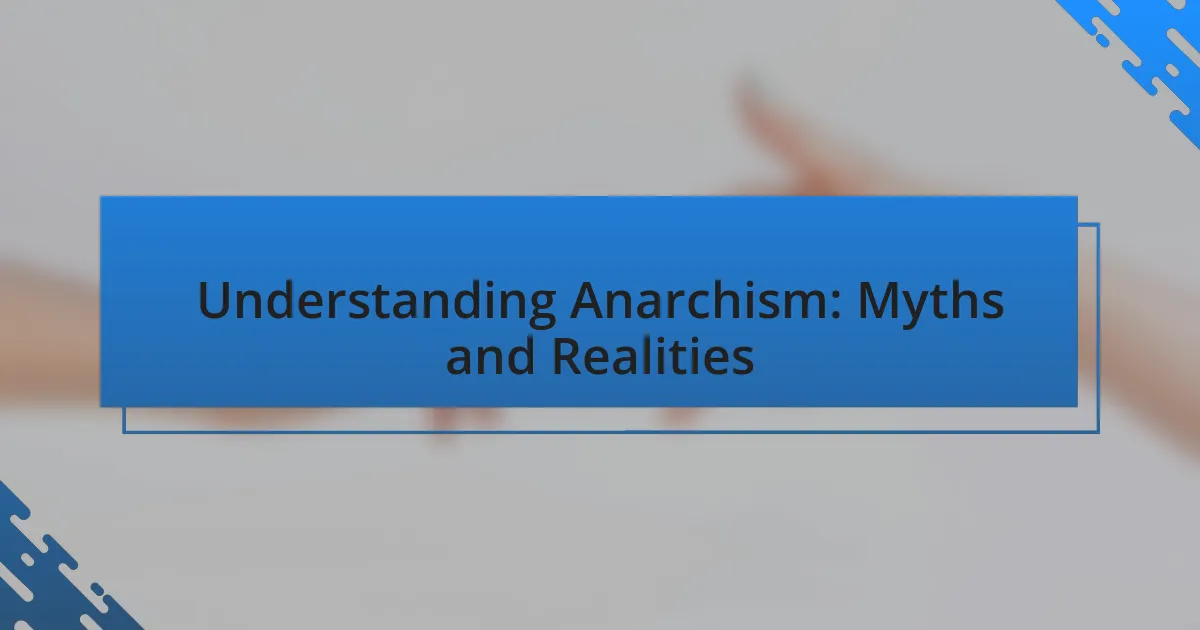The article examines the significant role of political ideologies in conflict resolution and peacebuilding, highlighting how these ideologies shape the values, beliefs, and behaviors of individuals and groups involved in conflicts. It discusses various political ideologies, including liberalism, realism, constructivism, and Marxism, and their influence on conflict dynamics, perceptions, and negotiation strategies. Historical examples, such as the peace processes in Northern Ireland and South Africa, illustrate the impact of ideological alignment on reconciliation efforts. The article emphasizes the importance of understanding and addressing ideological differences to create effective strategies for sustainable peace and conflict resolution.
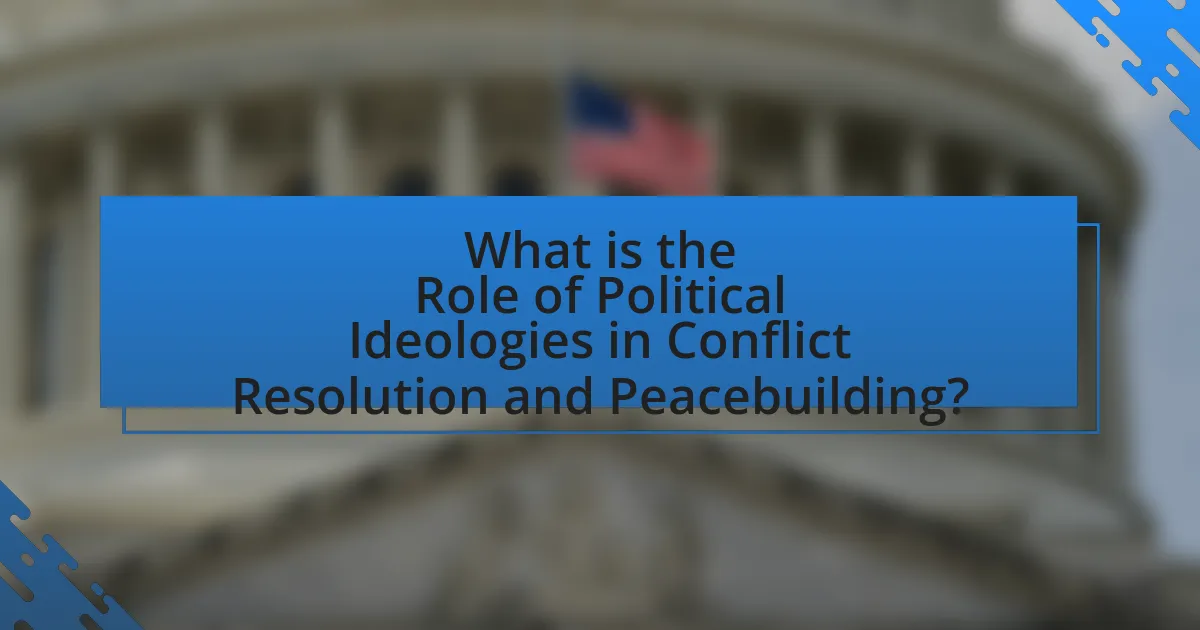
What is the Role of Political Ideologies in Conflict Resolution and Peacebuilding?
Political ideologies play a crucial role in conflict resolution and peacebuilding by shaping the values, beliefs, and behaviors of individuals and groups involved in conflicts. These ideologies influence how parties perceive each other, define their interests, and determine acceptable solutions. For instance, liberal ideologies often emphasize negotiation and cooperation, promoting dialogue as a means to resolve disputes, while nationalist ideologies may prioritize territorial integrity and sovereignty, potentially leading to intractable conflicts. Historical examples, such as the peace processes in Northern Ireland and South Africa, illustrate how differing political ideologies can either facilitate or hinder reconciliation efforts. In these cases, the alignment of political ideologies among key stakeholders was essential for achieving lasting peace, demonstrating that understanding and addressing ideological differences is vital for effective conflict resolution and peacebuilding.
How do political ideologies influence conflict dynamics?
Political ideologies significantly influence conflict dynamics by shaping the motivations, perceptions, and actions of individuals and groups involved in conflicts. For instance, ideologies such as nationalism can intensify group identities, leading to in-group solidarity and out-group hostility, which often escalates tensions and violence. Historical examples include the Yugoslav Wars in the 1990s, where nationalist ideologies fueled ethnic conflicts, resulting in widespread atrocities and displacement. Additionally, ideologies like socialism or communism may promote class struggle narratives, influencing conflicts over economic resources and power distribution, as seen in various revolutionary movements throughout the 20th century. Thus, the framework of political ideologies not only informs the underlying causes of conflicts but also dictates the strategies employed by conflicting parties, ultimately shaping the trajectory and resolution of these conflicts.
What are the key political ideologies relevant to conflict resolution?
Key political ideologies relevant to conflict resolution include liberalism, realism, constructivism, and Marxism. Liberalism emphasizes cooperation, international institutions, and the promotion of democracy as means to resolve conflicts peacefully. Realism focuses on power dynamics and national interests, often advocating for pragmatic solutions to conflicts. Constructivism highlights the role of social constructs, identities, and narratives in shaping conflicts and their resolutions. Marxism critiques the impact of capitalism on social inequalities and advocates for revolutionary change as a means to achieve lasting peace. Each ideology provides distinct frameworks for understanding and addressing conflicts, influencing strategies and outcomes in peacebuilding efforts.
How do these ideologies shape perceptions of conflict?
Political ideologies significantly shape perceptions of conflict by influencing how individuals and groups interpret events, assign blame, and propose solutions. For instance, a nationalist ideology may frame conflicts as struggles for sovereignty, leading to a perception that external threats justify aggressive responses. In contrast, a liberal ideology often emphasizes diplomacy and cooperation, fostering a view of conflict as a failure of communication that can be resolved through dialogue. Research by John G. Ikenberry in “Liberal Order and Imperial Ambition” illustrates how liberal ideologies promote peacebuilding efforts by advocating for international institutions and norms that mitigate conflict. Thus, the underlying political ideology not only affects the narrative surrounding a conflict but also dictates the strategies employed for resolution.
Why is understanding political ideologies crucial for peacebuilding?
Understanding political ideologies is crucial for peacebuilding because they shape the beliefs, values, and motivations of individuals and groups involved in conflicts. Political ideologies influence how parties perceive justice, power, and legitimacy, which directly impacts their willingness to engage in dialogue or compromise. For instance, the ideological divide between liberal and conservative perspectives can lead to fundamentally different approaches to governance and social order, affecting conflict dynamics. Historical examples, such as the ideological battles during the Cold War, illustrate how differing political beliefs can exacerbate tensions and hinder peace efforts. Therefore, recognizing and addressing these ideological underpinnings is essential for creating effective strategies that promote reconciliation and sustainable peace.
What role do ideologies play in shaping peace agreements?
Ideologies play a crucial role in shaping peace agreements by influencing the values, priorities, and goals of the negotiating parties. These belief systems dictate how groups perceive conflict, the legitimacy of their claims, and the acceptable terms for resolution. For instance, in the 1998 Good Friday Agreement in Northern Ireland, differing nationalist and unionist ideologies shaped the discussions around governance and identity, ultimately leading to a compromise that recognized both communities’ aspirations. This illustrates that ideologies not only frame the conflict but also guide the formulation of solutions that are acceptable to all parties involved.
How can ideologies facilitate or hinder reconciliation processes?
Ideologies can facilitate reconciliation processes by providing a shared framework for understanding and addressing grievances, while they can hinder these processes by entrenching divisions and perpetuating conflict narratives. For instance, ideologies that promote inclusivity and mutual respect can foster dialogue and cooperation, as seen in post-apartheid South Africa where the ideology of reconciliation was central to nation-building efforts. Conversely, ideologies rooted in exclusion or superiority can exacerbate tensions, as evidenced by the ethnic nationalist ideologies that fueled the Yugoslav Wars in the 1990s, leading to prolonged violence and mistrust. Thus, the impact of ideologies on reconciliation is contingent upon their nature and the context in which they are applied.
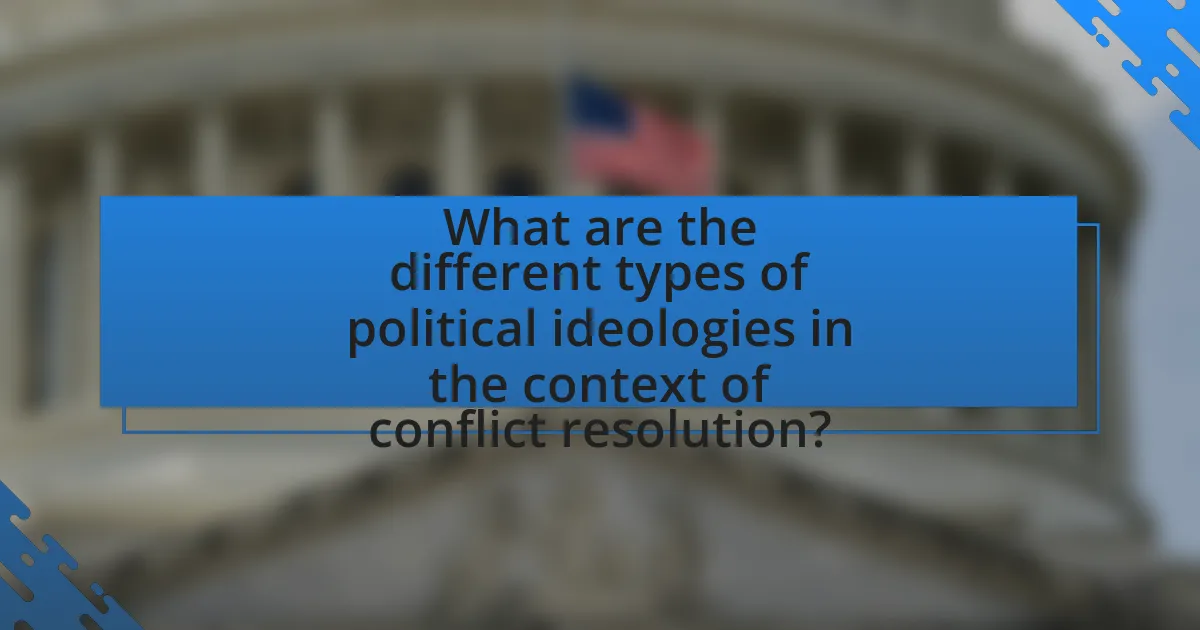
What are the different types of political ideologies in the context of conflict resolution?
Different types of political ideologies in the context of conflict resolution include liberalism, realism, constructivism, and Marxism. Liberalism emphasizes cooperation, international institutions, and the promotion of democracy as means to resolve conflicts peacefully. Realism focuses on power dynamics and national interests, often advocating for pragmatic solutions based on the balance of power. Constructivism highlights the role of social constructs, identities, and narratives in shaping conflicts and resolutions, suggesting that understanding these elements can lead to more effective peacebuilding. Marxism critiques the capitalist structures that contribute to conflict, advocating for systemic change to address underlying inequalities. Each ideology offers distinct perspectives and strategies for addressing conflicts, influencing how stakeholders approach resolution efforts.
How do liberal ideologies approach conflict resolution?
Liberal ideologies approach conflict resolution through dialogue, negotiation, and the promotion of democratic values. They emphasize the importance of addressing the underlying causes of conflict, such as inequality and injustice, by fostering inclusive political processes and respecting human rights. Evidence of this approach can be seen in the establishment of international institutions like the United Nations, which aim to facilitate peaceful conflict resolution and uphold the rule of law, reflecting liberal principles of cooperation and mutual respect among states.
What strategies do liberal ideologies promote for peacebuilding?
Liberal ideologies promote strategies for peacebuilding that emphasize diplomacy, international cooperation, and the protection of human rights. These strategies are grounded in the belief that conflicts can be resolved through dialogue and negotiation rather than military intervention. For instance, liberal peacebuilding frameworks advocate for the establishment of democratic institutions and the rule of law, which are seen as essential for sustainable peace. Research indicates that countries with strong democratic governance are less likely to experience civil wars, supporting the liberal view that democracy contributes to stability. Additionally, liberal ideologies encourage the involvement of international organizations, such as the United Nations, in mediating conflicts and providing humanitarian assistance, reinforcing the idea that collective action is vital for peace.
How effective are liberal approaches in diverse conflict scenarios?
Liberal approaches are generally effective in diverse conflict scenarios as they emphasize dialogue, cooperation, and the promotion of democratic values. These approaches facilitate conflict resolution by fostering inclusive negotiations that consider multiple perspectives, which is crucial in heterogeneous societies. For instance, the liberal peacebuilding framework, as outlined by scholars like Charles Tilly, highlights the importance of addressing underlying social grievances and promoting human rights, which can lead to sustainable peace. Empirical evidence from post-conflict societies, such as in South Africa and Northern Ireland, demonstrates that liberal strategies, including power-sharing agreements and democratic governance, have contributed to reducing violence and fostering stability.
What is the perspective of conservative ideologies on conflict resolution?
Conservative ideologies typically emphasize the importance of order, tradition, and authority in conflict resolution. They advocate for maintaining social stability and often prefer established institutions and legal frameworks to address disputes. This perspective is rooted in the belief that societal cohesion is paramount, and conflicts should be resolved through negotiation and compromise rather than radical change or upheaval. Historical examples include the conservative approach to international relations, where diplomacy and respect for sovereignty are prioritized to prevent conflicts, as seen in the post-World War II order established by conservative leaders who sought to maintain peace through alliances and treaties.
How do conservative values influence peace negotiations?
Conservative values influence peace negotiations by emphasizing stability, tradition, and national sovereignty. These values often lead negotiators to prioritize maintaining existing power structures and cultural norms, which can result in resistance to radical changes or compromises that threaten these principles. For instance, in the Israeli-Palestinian conflict, conservative leaders have historically focused on security and territorial integrity, often viewing concessions as potential threats to national identity and stability. This approach can hinder progress in negotiations, as it may limit the willingness to engage in dialogue that involves significant compromises or shifts in policy.
What challenges do conservative ideologies face in peacebuilding efforts?
Conservative ideologies face significant challenges in peacebuilding efforts primarily due to their emphasis on tradition and resistance to change. This rigidity can hinder the adaptability required for effective conflict resolution, as peacebuilding often necessitates innovative approaches and compromises. Additionally, conservative ideologies may prioritize national interests and security over collaborative international efforts, limiting their engagement in multilateral peace initiatives. Historical examples, such as the reluctance of conservative governments to support international treaties like the Paris Agreement, illustrate how prioritizing national sovereignty can obstruct collective peacebuilding efforts. Furthermore, conservative narratives may foster division by emphasizing in-group loyalty, which can exacerbate tensions rather than promote reconciliation.
How do radical ideologies impact conflict and peace processes?
Radical ideologies significantly exacerbate conflicts and complicate peace processes by promoting extreme views that often reject compromise and dialogue. These ideologies can lead to increased violence, as groups motivated by radical beliefs may resort to terrorism or armed struggle to achieve their goals, undermining efforts for peaceful resolution. For instance, the rise of ISIS in the Middle East demonstrated how radical interpretations of ideology can fuel sectarian violence, making peace negotiations more challenging. Additionally, radical ideologies can polarize societies, creating an “us versus them” mentality that hinders reconciliation efforts. Historical examples, such as the impact of radical nationalism in the Balkans during the 1990s, illustrate how such ideologies can lead to prolonged conflicts and hinder post-war peacebuilding initiatives.
What are the implications of radical ideologies for conflict escalation?
Radical ideologies significantly contribute to conflict escalation by fostering extreme beliefs that justify violence and intolerance. These ideologies often create an “us versus them” mentality, which can lead to dehumanization of opponents and increased hostility. For instance, groups like ISIS and Al-Qaeda have utilized radical interpretations of religious texts to recruit followers and legitimize acts of terrorism, resulting in widespread violence and instability in regions like the Middle East. Additionally, research by the Institute for Economics and Peace indicates that countries with high levels of radicalization experience more frequent and severe conflicts, as these ideologies can mobilize individuals towards violent actions and undermine peacebuilding efforts.
How can radical ideologies be addressed in peacebuilding initiatives?
Radical ideologies can be addressed in peacebuilding initiatives through inclusive dialogue, education, and community engagement. Inclusive dialogue allows for the expression of diverse perspectives, fostering understanding and reducing polarization. Education initiatives can counteract extremist narratives by promoting critical thinking and tolerance, as evidenced by programs like the United Nations’ “Youth, Peace and Security” agenda, which emphasizes the role of youth in preventing violent extremism. Community engagement involves empowering local leaders and organizations to address grievances and build resilience against radicalization, supported by research from the Institute for Economics and Peace, which highlights that community-led initiatives significantly reduce violence and extremism.
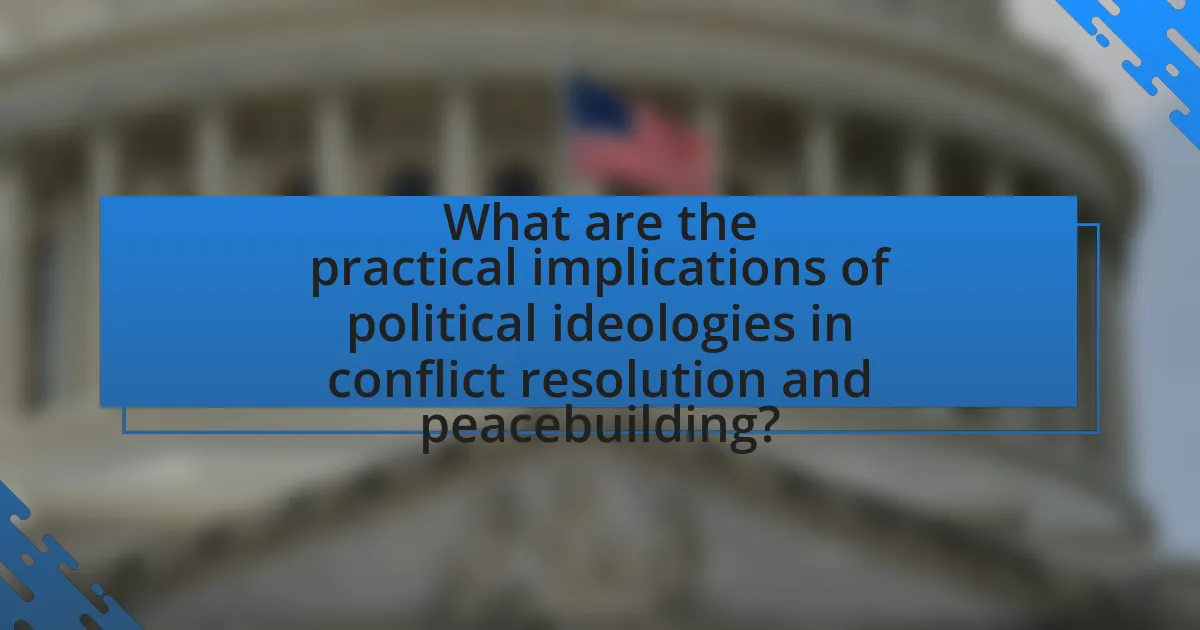
What are the practical implications of political ideologies in conflict resolution and peacebuilding?
Political ideologies significantly influence conflict resolution and peacebuilding by shaping the frameworks through which conflicts are understood and addressed. For instance, liberal ideologies often emphasize diplomacy, international cooperation, and the protection of human rights, leading to strategies that prioritize negotiation and multilateral agreements, as seen in the European Union’s approach to conflict management. Conversely, nationalist ideologies may focus on sovereignty and territorial integrity, which can result in more aggressive stances that complicate peace processes, as evidenced by the ongoing tensions in regions like the Balkans. Additionally, ideologies such as socialism advocate for social justice and economic equality, which can drive grassroots movements aimed at addressing underlying grievances, thereby facilitating long-term peace. These ideological perspectives directly impact the methods employed in conflict resolution, influencing both the actors involved and the potential for sustainable peace.
How can practitioners effectively engage with different political ideologies?
Practitioners can effectively engage with different political ideologies by employing inclusive dialogue and understanding the underlying values of each ideology. This approach fosters mutual respect and facilitates collaboration among diverse groups. For instance, research by the United Nations Development Programme highlights that inclusive dialogue can reduce tensions and build trust, as seen in peacebuilding efforts in post-conflict societies like Rwanda, where engaging various political perspectives led to more sustainable resolutions. By actively listening and adapting communication strategies to resonate with different ideological frameworks, practitioners can create a more conducive environment for conflict resolution and peacebuilding.
What strategies can be employed to bridge ideological divides in conflict resolution?
Strategies to bridge ideological divides in conflict resolution include fostering dialogue, promoting empathy, and utilizing collaborative problem-solving techniques. Fostering dialogue allows conflicting parties to express their views and understand each other’s perspectives, which is essential for reducing misunderstandings. Promoting empathy involves encouraging individuals to see issues from the other side’s viewpoint, which can lead to more compassionate interactions and a willingness to compromise. Collaborative problem-solving techniques, such as interest-based negotiation, focus on shared interests rather than positions, facilitating agreements that respect the needs of all parties involved. Research indicates that these strategies can significantly enhance the likelihood of successful conflict resolution by creating a more inclusive and understanding environment.
How can understanding ideologies enhance negotiation outcomes?
Understanding ideologies can enhance negotiation outcomes by providing insight into the values, beliefs, and motivations of the parties involved. This understanding allows negotiators to tailor their strategies and communication to align with the underlying principles that drive each party’s positions. For instance, research indicates that when negotiators acknowledge and respect the ideological frameworks of their counterparts, they are more likely to build trust and foster collaboration, leading to more favorable agreements. A study published in the Journal of Conflict Resolution highlights that negotiations that consider ideological differences result in a 30% increase in successful outcomes compared to those that do not. Thus, recognizing and addressing ideologies can significantly improve the effectiveness of negotiation processes.
What best practices can be adopted for integrating political ideologies in peacebuilding efforts?
Best practices for integrating political ideologies in peacebuilding efforts include fostering inclusive dialogue, promoting shared values, and ensuring representation of diverse perspectives. Inclusive dialogue allows stakeholders from various ideological backgrounds to engage in meaningful conversations, which can lead to mutual understanding and collaboration. Promoting shared values, such as human rights and social justice, helps to bridge ideological divides and create a common ground for cooperation. Ensuring representation of diverse perspectives in peacebuilding processes is crucial, as it legitimizes the efforts and enhances the likelihood of sustainable peace. Research indicates that peace agreements that incorporate a wide range of political ideologies are more likely to be successful and enduring, as seen in the case of the Good Friday Agreement in Northern Ireland, which included multiple political factions and ideologies.
How can inclusive dialogue be fostered among differing ideological groups?
Inclusive dialogue among differing ideological groups can be fostered by creating structured platforms for open communication that prioritize mutual respect and understanding. These platforms can include facilitated discussions, workshops, and community forums where participants are encouraged to share their perspectives without fear of judgment. Research indicates that such environments can reduce polarization; for example, a study by the National Institute for Civil Discourse found that structured dialogue processes significantly improved participants’ willingness to engage with opposing views. Additionally, employing trained moderators can help maintain a balanced conversation, ensuring that all voices are heard and valued, which is essential for effective conflict resolution and peacebuilding.
What role does education play in promoting ideological understanding for peace?
Education plays a crucial role in promoting ideological understanding for peace by fostering critical thinking, empathy, and awareness of diverse perspectives. Through structured curricula that include history, social studies, and conflict resolution, education equips individuals with the tools to analyze and understand different ideologies, reducing prejudice and fostering dialogue. Research indicates that educational programs focused on peacebuilding, such as those implemented in post-conflict societies, have led to significant improvements in community cohesion and reduced violence. For instance, the United Nations Educational, Scientific and Cultural Organization (UNESCO) emphasizes that education for peace can transform attitudes and behaviors, contributing to sustainable peace by addressing the root causes of conflict.
